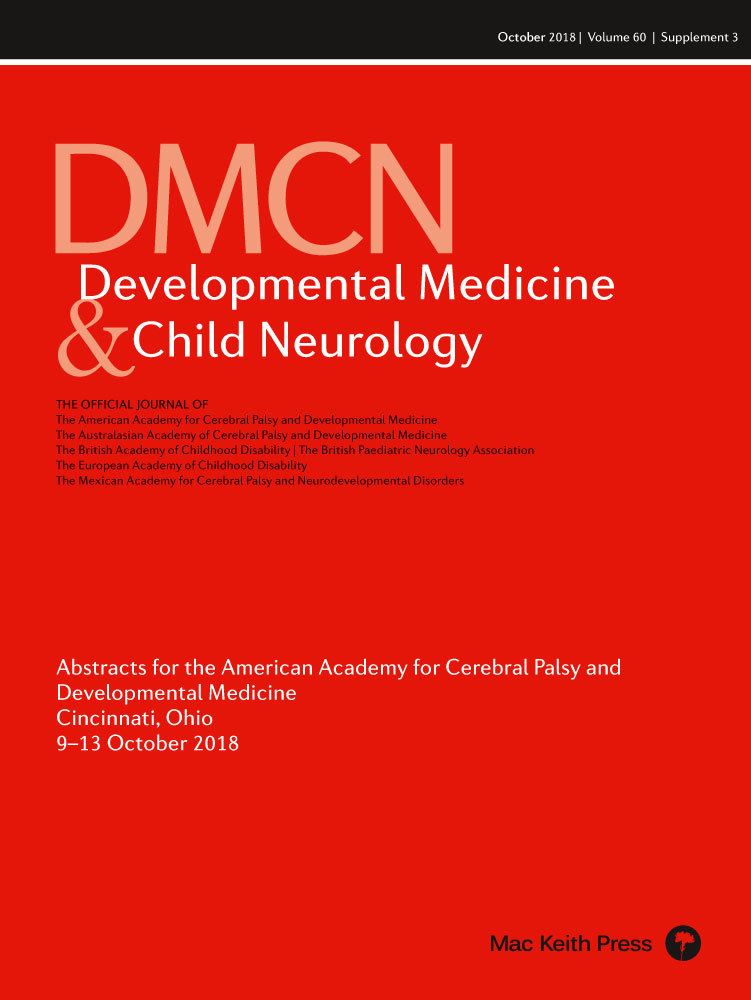The formula for health and well-being: cross-sectional data on physical activity, sleep, and nutrition in individuals with cerebral palsy
SP36
P McPhee1, O Verschuren2,3, M Peterson4, A Tang5, J Willem Gorter6
1School of Rehabilitation Science, McMaster University, Ontario, Canada; 2Brain Center Rudolf Magnus and Center of Excellence for Rehabilitation Medicine, University Medical Center, Utrecht, The Netherlands; 3De Hoogstraat Rehabilitation, Utrecht, The Netherlands; 4Department of Physical Medicine and Rehabilitation, University of Michigan, Ann Arbor, MI, USA; 5McMaster University, Ontario, Canada; 6Department of Pediatrics, McMaster University, Ontario, Canada
Background and Objective(s): Clinical follow-up for individuals with cerebral palsy (CP) after their transition from pediatric to adult services is lacking, and there is need for surveillance efforts to track people with CP through the lifespan. The promotion of behaviour modifications in CP, including physical activity, sleep, and nutrition are important in the light of preventive medicine. To date, there have been no systematic observational studies to examine all three of these factors in a cohort of individuals with CP. To optimize the health of people with CP, we argued that the formula of physical activity, sleep and nutrition needs attention in clinic. To guide clinicians, a first step is to get insight in a comprehensive assessment of these components and see if individuals with different Gross Motor Function Classification System (GMFCS) levels experience different problems. Therefore, the objectives of this study were to describe physical activity behaviours, sleep quantity and quality, and eating behaviours in individuals with CP and to investigate the influence of GMFCS grouping on these three components of health.
Study Design: Cross-sectional study.
Study Participants & Setting: A convenience sample of 28 individuals with CP (mean age 35.1y [SD 14.4y]; min-max 16–78) across all five levels of the GMFCS were recruited from the community.
Materials/Methods: A Leisure Time Physical Activity Questionnaire or Exercise Questionnaire was used to measure physical activity in adult and adolescent participants, respectively. Sleep quantity and quality were measured using the Pittsburgh Sleep Quality Index (PSQI). An adapted version of the PrimeScreen questionnaire was used to measure eating behaviours and food choices over a 6 month period.
Results: The mean total physical activity for subjects was 29.2 (SD 30.0) mins/day. Twenty-one (75%) subjects had PSQI scores greater than 5, indicative of poor sleep quality. Sixteen (57%) subjects had less than 7 hours of sleep per night, which is the recommended duration for adults. Ten (36%) subjects indicated that they were using medication to assist with sleeping. While the majority of subjects reported eating behaviours which were categorized as fair, four (14%) subjects had good eating behaviours while 4 subjects had poor eating behaviours. GMFCS (ambulatory vs. non-ambulatory) was not an independent predictor of PSQI score, PrimeScreen score, or total physical activity (mins/day) (all p>0.05). However, a negative correlation existed between sleep quantity (hours/night) and PSQI score (r=−0.661, p<0.01).
Conclusions/Significance: From these initial findings in individuals with CP, it appears that physical activity, sleep, and eating behaviours are all important components of health that require attention from clinicians across the lifespan. Importantly, GMFCS grouping was not a significant predictor of any component of health, which tells us that these components should be managed in all people with CP, regardless of GMFCS level.




